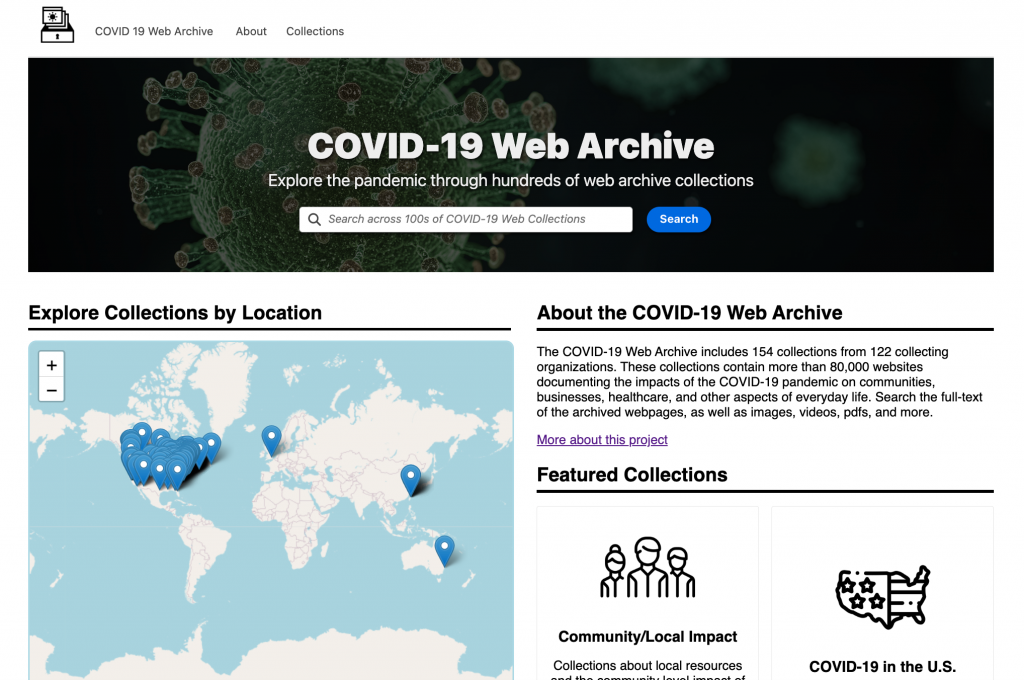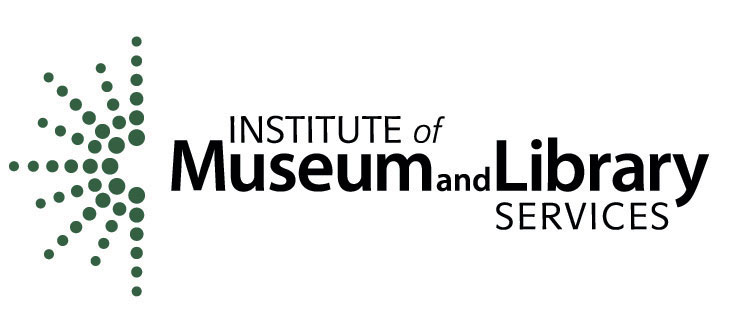We are pleased to announce that the COVID-19 Web Archive is now available! As the COVID-19 pandemic emerged in early 2020, librarians, archivists, and others with interest in preserving cultural heritage began documenting the personal, cultural, and societal impact of the global pandemic on their communities. These efforts included creating archival collections preserving physical, digital, and web-based records and information for use by students, scholars, and citizens. In response to this immediate need for archiving resources by both libraries and memory institutions, the Internet Archive’s Archive-It service launched a COVID-19 Web Archiving Special Campaign in April 2020 providing free and subsidized tools, training, and community support to institutions and local efforts to preserve web-published materials documenting the COVID-19 pandemic.
The COVID-19 Web Archive builds on this curatorial work to gather together more than 160 web archive collections created by more than 125 libraries, archives, and cultural heritage organizations into a shared access portal built and maintained by the Internet Archive. The COVID-19 Web Archive currently totals nearly 90 terabytes of archived data composed of over 1.5 billion webpages and allows for full text, metadata, and media search within individual collections and across the entire archive. The archive will be continuously updated over time. If you have a collection you’d like to include in the portal, please contact us at covidwebarchive@archive.org.
Collections document the pandemic from a number of different perspectives, including:
- Athens Regional Library System’s Athens, Georgia Area COVID-19 Response collection, which highlights “the local response to the coronavirus (COVID-19) pandemic in Athens, Georgia. Included are communications from Athens-Clarke County government, communications from Clarke County School District, fundraisers for local businesses, ‘Band Together’ showcases, and various other items that are related to the local response.”
- University of British Columbia’s COVID-19, Racism, and Asian Communities collection, which documents incidents of racism against the Asian communities in Canada, related to the COVID-19 pandemic.
- New York University’s Tamiment Wagner: NYC COVID-19 Web Activism collection, which “documents activists’ use of social media and the internet to create content, online campaigns, online actions, virtual mutual aid networks and funds to highlight, resist, and call attention to ways in which COVID-19 has impacted New York City physically, emotionally, politically, and economically.”
- Pennsylvania Horticultural Society’s COVID-19 Collection, “focus[ed] on the Pennsylvania Horticultural Society’s programmatic COVID-19 response via #GrowTogetherPHS, a campaign to engage our audiences in gardening at home.”
The browsing and searching capabilities available on the COVID-19 Web Archive website are augmented by the availability of public datasets, as well as a series of in-person and virtual data analysis workshops which will facilitate a myriad of potential avenues for research use of web archives. A number of research projects and use cases for COVID-19-related web archives have already emerged from the work of ARCH (Archives Research Compute Hub) cohort program members in 2021-2022.
If you are interested in learning more about the COVID-19 Web Archive and associated research opportunities, we are holding an informational webinar on Thursday, October 27 at 11am PT. A walkthrough of the COVID-19 Web Archive is available here.
The COVID-19 Web Archive was made possible with generous support from the Institute of Museum and Library Services (IMLS) as part of their American Rescue Plan grant program.

